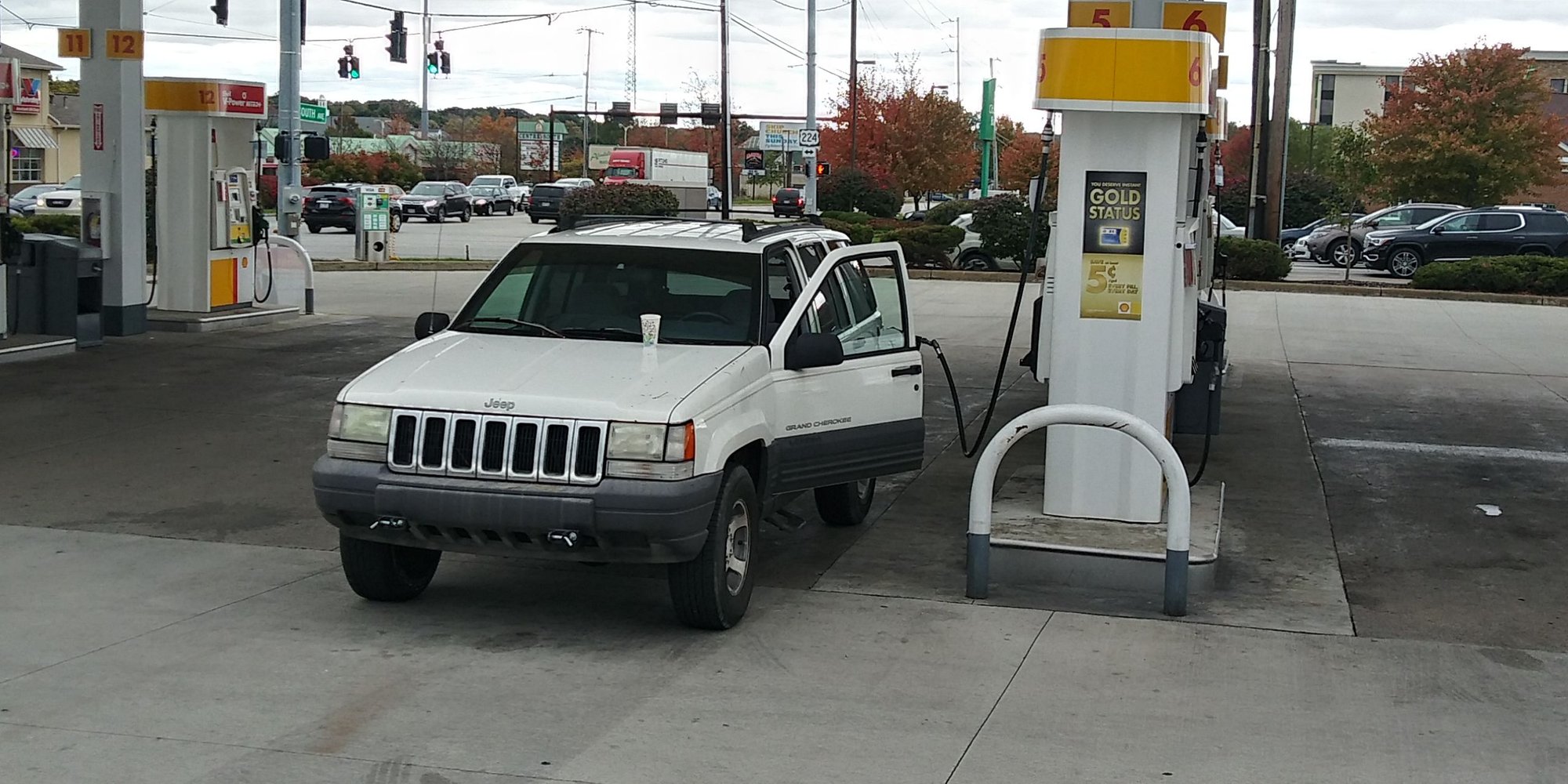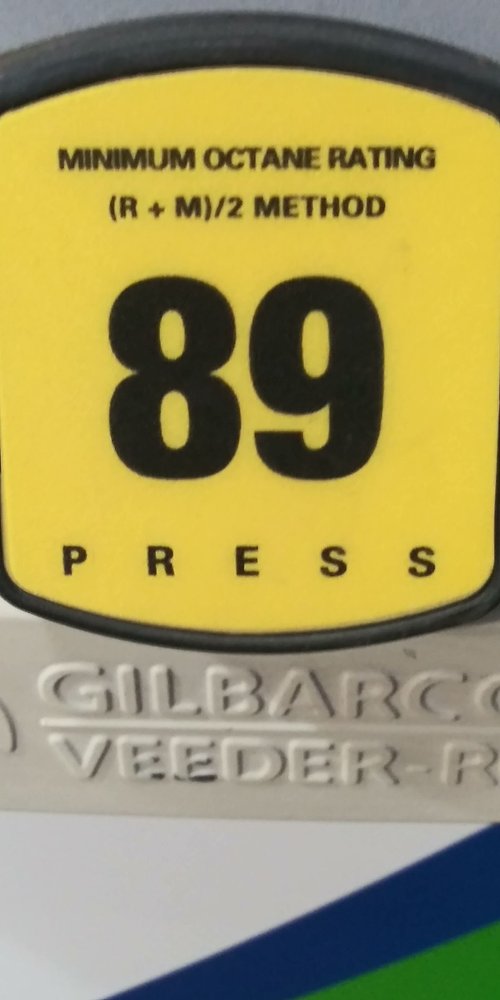87 or 93 octane gasoline for ZJ?
#1
Banned
Thread Starter

I think the engines between the 2004 WJ 4.0L and the 1997 ZJ 4.0L model Jeep Grand Cherokees are similar? I know for the WJ it runs best on neither the 87 or 93 octane fuels. It runs better on the mid-level grade gasoline. I think it is 89?
I just got back to where I have been keeping my ZJ. I am about to fill it up, and I do not want to accidentally put in the wrong type?
#3
Newbie
Join Date: Sep 2019
Location: Queens
Posts: 5
Likes: 0
Received 0 Likes
on
0 Posts
Year: 1994
Model: Cherokee (XJ)
Engine: 5.2
87 is fine on both. They are not high compression or turbocharged engines. Most engine have a knock sensor which can sense pinging caused by different fuel grades and adjust timing accordingly. If you notice its truly running better on 89 octane, you might want to check the timing.
#4
Old fart with a wrench
On the injected 4.0, the timing is controlled by the PCM and as long as the distributor (if equipped with one) is set within the proper range, the timing will adjust automatically. On the WJ with it's coil rail, the cam sensor only controls fuel sync, not timing. Both are designed to run on 87, however some suppliers aren't too good at holding the 87 rating. I do find both my 4.0s seem to respond to 89 with quicker starts and better throttle response, especially in winter. 93 doesn't do anything but drain my wallet.
#5
Banned
Thread Starter

Thanks! I am going to put 87 octane in it.
No. I do not truly notice any differences between 87 or 89 octane fuels. I never tried high-grade though. I'm not sure? I do not think it will be any better than the 87 though?
I do not think you can even notice it, but I believe 89 octane is actually better for the engine performance?
Last edited by Noah911; 10-17-2019 at 01:29 PM.
#6
Old fart with a wrench
IDK, maybe it's just physiological, but I notice the difference. Just recently I've got a new problem with my XJ. I think I have one injector leaking down overnight because I have to double-prime the rail in the morning or it won't fire right up, and when it's hot and you do a restart after just a couple of minutes, it will stumble until it cleans itself out. I did notice the coils on 2 of them are cracked. Time for a set of 4-holers.
#7
CF Veteran
Join Date: May 2012
Location: Lost in the wilds of Virginia
Posts: 7,964
Received 956 Likes
on
771 Posts
Year: 1998 Classic (I'll get it running soon....) and 02 Grand
Model: Cherokee (XJ)
Engine: 4.0
Oddly enough, the only difference between 87 and 89 octane is... the octane rating. The octane rating relates to the fuel's resistance to ignition. It has NOTHING to do with power.
A higher octane fuel can be run at higher compression without detonation, thus a higher octane fuel is used in higher compression engines. Higher compression engines produce more power, thus the mistaken idea that high octane fuel provides more power. It does not. It merely allows engine compression levels to be higher, and the higher compression levels produce more power.
On the timing front, a higher octane fuel can tolerate more advanced timing without detonation. More advanced timing produces more power (to a point), thus an engine running more advanced timing produces more power, thus the mistaken idea that high octane fuel provides more power. It does not. It merely allows more advanced timing, and the advanced timing produces more power.
In a modern computer controlled engine with knock sensors, the computer will advance the timing just to the point of detonation. Thus, these engines will produce more power when run on higher octane fuel. Again, it's the timing advance that does it, not the octane.
87, 89, 93, 105 octane, it makes no difference. The energy content is exactly the same. There is no more "power" in any of them. They are equal.
It's the timing and compression differences that create the difference in power, and may also create quicker starts, I suppose.
After all that engineering, the marketing gurus get into the act and confuse the issue. A fuel maker may decide to sell his 87, 89, and 93 with all the same additive packages (detergents, mainly) and thus all of the above is true.
OR, he may decide to market the 87 with a minimal package as a bargain-basement product, and decide to add more/better additives to the 89 and 93 to differentiate them as superior products. Thus, the long haul performance might be different.
But again, it's not the octane rating that is making the difference. It's the additive package.
A higher octane fuel can be run at higher compression without detonation, thus a higher octane fuel is used in higher compression engines. Higher compression engines produce more power, thus the mistaken idea that high octane fuel provides more power. It does not. It merely allows engine compression levels to be higher, and the higher compression levels produce more power.
On the timing front, a higher octane fuel can tolerate more advanced timing without detonation. More advanced timing produces more power (to a point), thus an engine running more advanced timing produces more power, thus the mistaken idea that high octane fuel provides more power. It does not. It merely allows more advanced timing, and the advanced timing produces more power.
In a modern computer controlled engine with knock sensors, the computer will advance the timing just to the point of detonation. Thus, these engines will produce more power when run on higher octane fuel. Again, it's the timing advance that does it, not the octane.
87, 89, 93, 105 octane, it makes no difference. The energy content is exactly the same. There is no more "power" in any of them. They are equal.
It's the timing and compression differences that create the difference in power, and may also create quicker starts, I suppose.
After all that engineering, the marketing gurus get into the act and confuse the issue. A fuel maker may decide to sell his 87, 89, and 93 with all the same additive packages (detergents, mainly) and thus all of the above is true.
OR, he may decide to market the 87 with a minimal package as a bargain-basement product, and decide to add more/better additives to the 89 and 93 to differentiate them as superior products. Thus, the long haul performance might be different.
But again, it's not the octane rating that is making the difference. It's the additive package.
Last edited by BlueRidgeMark; 10-17-2019 at 04:03 PM.
Trending Topics
#8
CF Veteran
^^^ I agree, if an engine is designed to run on 87 you don't gain anything by running premium. Also at most gas stations they only have a tank for regular 87 and a tank for premium, when you select the midgrade all it does is mix the two from each tank.
#9
CF Veteran
Join Date: May 2012
Location: Lost in the wilds of Virginia
Posts: 7,964
Received 956 Likes
on
771 Posts
Year: 1998 Classic (I'll get it running soon....) and 02 Grand
Model: Cherokee (XJ)
Engine: 4.0
I've watched them unload three tanks at many a gas station, including one I worked at, and one my son works at. I don't think they mix them.
#10
CF Veteran
I am electrician and the gas stations we wire only have a tank for premium and a tank for regular, when you select the mid grade both pumps come on. I'm not saying all gas stations are like that but the ones we do are.
#11
Old fart with a wrench
I'd like to make an observation about octane. The higher an octane rating is, the slower the fuel burns, or less easily it ignites when at the same pressure. SO, when using a high octane fuel in a low compression engine, the fuel must be ignited sooner to produce the same power during the cylinder stroke. However, the reverse is true in that a low octane fuel used in a high compression engine will burn faster and create too much pressure in the piston before it travels over top center and will retard the piston enough to cause a reduction in power output and that "knock" sound as the fuel burns uncontrollably in what is called "detonation." In lightly built engines such as radial aircraft engines, detonation has been known to blow cylinders completely off the engine.
Case in point. The recent crash of the B17G, 9-0-9 showed the engines built at that time were designed to run on 87 octane fuel because that was the best available at the time, especially in a war zone. Since the end of that war, improvements were made to aircraft engines in the search for higher speeds and more performance to the point they were using 115/145 octane fuel and 2-stage superchargers. This B17 was not improved and was using 100 octane low lead fuel which is the best today for WWII "war birds." The superchargers had to be limited and the timing changed to handle this fuel. The results of the investigation have not been completed, but speculation is that the fuel used had something to do with the crash. I don't believe this to be true. I believe the aircraft was too low and too slow to make a proper approach.
The 3 tanks at service stations? One is diesel.
Case in point. The recent crash of the B17G, 9-0-9 showed the engines built at that time were designed to run on 87 octane fuel because that was the best available at the time, especially in a war zone. Since the end of that war, improvements were made to aircraft engines in the search for higher speeds and more performance to the point they were using 115/145 octane fuel and 2-stage superchargers. This B17 was not improved and was using 100 octane low lead fuel which is the best today for WWII "war birds." The superchargers had to be limited and the timing changed to handle this fuel. The results of the investigation have not been completed, but speculation is that the fuel used had something to do with the crash. I don't believe this to be true. I believe the aircraft was too low and too slow to make a proper approach.
The 3 tanks at service stations? One is diesel.
Last edited by dave1123; 10-18-2019 at 04:03 AM.
#12
Banned
Thread Starter
Diesel? I don't think you should run deisel fuels in a gasoline powered ZJ.
If you tried.. it would not ignite properly. Mixing gasoline and diesel in your tank and running it in the engine would likely cause it to stumble and stall out on you! Probably just foul your plugs all up and ruin your catalyst converter, and mess up your injectors, if you tried to run diesel fuel.
If you tried.. it would not ignite properly. Mixing gasoline and diesel in your tank and running it in the engine would likely cause it to stumble and stall out on you! Probably just foul your plugs all up and ruin your catalyst converter, and mess up your injectors, if you tried to run diesel fuel.
#13
Banned
Thread Starter

I just took this. I like how Glacier Lake has the trees leaves changing color. And of course the ZJ in the mirror, and the trees leaves changing color pictured in the mirror too.
I need to get my ZJ fully winterized. It will require a battery and block heater elements tied into it.
I'm not sure what else I should do for it? I know I am going to determine the most optimal antifreeze mixture. Make sure I end up with this ratio for coolant... Most likely a good set of actual winter tires. Winter tires make good sense, if you spend months in cold snow and blizzard climate during the year. The decreased tread removed from your primary set of tires lengthens significantly longer by getting and using winter wheels.
#14
Newbie
Join Date: Sep 2019
Location: Queens
Posts: 5
Likes: 0
Received 0 Likes
on
0 Posts
Year: 1994
Model: Cherokee (XJ)
Engine: 5.2
I had a friend who took his olds 350 and adjusted the timing to 2 degrees btdc so he could run 93 in it. It did have a little more power but was it more than 10hp? Probably not.
#15
Old fart with a wrench
Noah, I simply stated the third tank at gas stations is for diesel. I never said anything about using diesel in a gas engine! What have you been smoking?
The following users liked this post:
BlueRidgeMark (10-18-2019)


